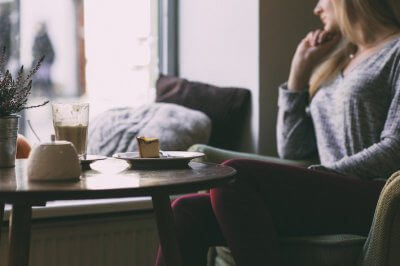Social Isolation and Productivity – Why Working Alone Can Backfire Big Time

photo by Pixabay for Pexels
by Andrea M. Darcy
Social isolation heavily affects our mental health and the way our brain functions.
So if you had grand plans for all you’d get done now you have moved to the countryside to write a book? Or quit a job in an office to launch a business at home alone? But find yourself underachieving and acting far from your typical self? Here’s why.
Social isolation and your brain
Psychologists have discovered that even if we perceive we are alone and isolated, versus really being so, it affects our health and our brain.
Less socialising, less oxytocin
Hugging and physical interaction lead to bonding, which involves the release of oxytocin, the brain’s ‘happy hormone’.
Even non-tactile positive social situations can give us some oxytocin.
A study published in ‘Biological Psychiatry’ found that oxytocin and social support together lead to lower cortisol levels, “as well as increased calmness and decreased anxiety during stress”. [2]
In other words, your all alone, hug-free existence as you write that book or launch that novel can be leaving you less able to cope.
Lack of social contact leaves us spaced out
 The less oxytocin, the harder it can be to focus.
The less oxytocin, the harder it can be to focus.
Oxytocin decreases activity in the amygdala, which is a good thing. The amygdala is the part of the brain that activates whenever there’s a perceived threat, leaving us in that horrid stress state that kills focus, where our brain is too distracted scanning for more danger.
A study on the way we scan others’ faces for danger found that increasing oxytocin via a shot of nasal solution meant less vigilance and feeling worried about danger.
So if not having social contact and physical contact with others can mean less oxytocin, it can mean that we are more easily triggered into stress state… and get nothing done.
Convinced others just make you feel trapped? And you NEED to be alone?
Sure this can’t be you, that you should be able to get a lot of work done alone, as you feel trapped by others? Felt suffocated in an office space with colleagues?
It’s a question of space. It is true that people getting too physically close to you can trigger the amygdala to decide there is a potential danger. So if your colleagues were always hanging over your desk and invading your personal space, you could have indeed been in ‘stress mode’, meaning fuzzy thinking and exhaustion.
But now you’ve gone to the other extreme instead of finding balance… you’re trying one of the new ways of working. But still aren’t high functioning!
Having emotional outbursts?
Feel stressed you aren’t getting tons done now you’ve chosen social isolation? And working from home? And think that slouching on the couch eating comfort food is the answer? Watch out.

By: Rolland Anthony
Your vagus nerve, stretching right from your brain down to your abdomen, is involved with the stress response. And it can be irritated by gastrointestinal upset… as well as poor posture! So sit up straight and eat healthy foods that don’t risk upsetting your gut.
Sleeping terribly since your self-imposed social isolation?
If you aren’t getting work done, and are worried you won’t reach a deadline or your new business will fail? You are living with the shadow of uncertainty.
And as a 2016 study by neuroscientists at University College London makes clear, uncertainty means our brain reacts with fear. Which means we go into loops of negative thinking, and things like our sleep suffers. [4]
And when we are tired, we struggle even more to focus.
Social isolation just leaving you… flat? Blah?
Your brain might have interrupted dopamine cycles because your usual routine isn’t happening. Dopamine is your brain’s show of positive reinforcement each time you complete a step or goal, and is connected to our rest and reward system.
For some of us, it can be our old routine that gives us all the little success moments that trigger this system and have it release dopamine. Got to work on time! Made a healthy lunch! Found a good outfit!
And now here we are, wearing the same track suit for the third day running, eating bags of crisps. Our rest and reward system has flatlined, we are low on dopamine. And that means less motivation.
Feeling downright sad?
The lack of or decreased physical movement that social isolation can lead to could be behind any low moods you are going through.
A cross-study over almost three thousand adults [5] found that we are less likely to be depressed if we participate in moderate to vigorous physical activity. This is particularly true if we are overweight. This link between low physical activity and depression was confirmed by later research using statistics from Health Survey for England. [6]
As well as pushing yourself to do some sort of exercise, consider doing short bouts of movement. Breaking up sitting time in intervals with light intensity activity is found to improve anti-anti-inflammatory responses. In other words, it helps your immune system.
Spending all your time in front of a screen?
If your trip away to finish that novel or your new time spent alone at home to launch a business sees you sitting in front of a screen all day working? And then spending all your down time also watching TV and films so you don’t go out and get distracted or spend money you don’t have? It might be contributing to any low moods you are experiencing.
A Scottish study looked at the lifestyles of almost four thousand men and women and found sedentary behaviour and screen time as leisure time was associated with poorer mental health scores. [7]
Suddenly getting colds and flus?
No, you aren’t just acting sick to get attention from friends back home if you’ve gone away to get work done! Social isolation affects our immune system.
A 2015 study out of the University of California looked at white blood cells, known for their important role in the immune system’s response to infections. It found that in both humans and rhesus monkeys, loneliness meant an increase in genes involved in inflammation, and a decrease in expression of genes connected to antiviral responses. [8]
So what to do if you need to get work done alone?
First of all, if this all sounds far too familiar? If you feel unmotivated, tired, sleepy, and stressed, despite all your good intentions to lock yourself in and be a work machine? Then cut yourself some slack.
You can’t win against a brain that is trying to protect you. And it truly isn’t your fault.
Then aim for balance. A great idea is to use social contact as a reward system, thus getting in some dopamine hits. Have a friend lined up to call after a certain amount of work. Or, if in the countryside, agree to let yourself go to a local village restaurant for dinner if you get a certain amount of work done.
If you really can’t work alone, then see it as a lesson. You tried, but now you know social isolation does not equal productivity for you. You might just be the type of person who works best in a crowded cafe.
Has a life change, job change, or move to the countryside meant you are always isolated and not feeling good about yourself? Our renowned London-based therapists are now available in London or by video conferencing. Or use our booking platform to find UK-wide affordable online therapy now.
 Andrea M. Darcy is the editor and lead writer of this site. She is infamous for going off the the countryside to get work done… and then doing nothing but spacing out. Find her @am_darcy
Andrea M. Darcy is the editor and lead writer of this site. She is infamous for going off the the countryside to get work done… and then doing nothing but spacing out. Find her @am_darcy
FOOTNOTES
[1]Tanskanen J, Anttila T. A Prospective Study of Social Isolation, Loneliness, and Mortality in Finland. Am J Public Health. 2016;106(11):2042–2048. doi:10.2105/AJPH.2016.303431.
[2]Markus Heinrichs, Thomas Baumgartner, Clemens Kirschbaum, Ulrike Ehlert,
Social support and oxytocin interact to suppress cortisol and subjective responses to psychosocial stress,Biological Psychiatry,Volume 54, Issue 12,2003,Pages 1389-1398.
ISSN 0006-3223,https://doi.org/10.1016/S0006-3223(03)00465-7.
[3]Kanat, M., Heinrichs, M., Mader, I. et al. Oxytocin Modulates Amygdala Reactivity to Masked Fearful Eyes. Neuropsychopharmacol 40, 2632–2638 (2015). https://doi.org/10.1038/npp.2015.111.
[4] de Berker, A., Rutledge, R., Mathys, C. et al. Computations of uncertainty mediate acute stress responses in humans. Nat Commun 7, 10996 (2016). https://doi.org/10.1038/ncomms10996.
[5] Jeff K. Vallance, Elisabeth A.H. Winkler, Paul A. Gardiner, Genevieve N. Healy, Brigid M. Lynch, Neville Owen, Associations of objectively-assessed physical activity and sedentary time with depression: NHANES (2005–2006), Preventive Medicine,
Volume 53, Issues 4–5, 2011, Pages 284-288, ISSN 0091-7435, https://doi.org/10.1016/j.ypmed.2011.07.013.
[6]Associations between objectively assessed and self-reported sedentary time with mental health in adults: an analysis of data from the Health Survey for England.
[7] Television- and Screen-Based Activity and Mental Well-Being in Adults Hamer, Mark et al. American Journal of Preventive Medicine, Volume 38, Issue 4, 375 – 380.
[8] Myeloid differentiation in social isolation.





